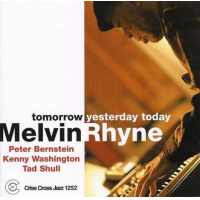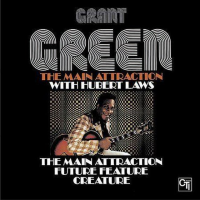Home » Jazz Articles » Liner Notes » Wycliffe Gordon: What You Dealin' With?
Wycliffe Gordon: What You Dealin' With?
A native of Georgia, Gordon was born in 1967 and was first introduced to music by a father who "studied classical music and played classical music around the house when we were young." By the age of 12, Gordon had begun his trombone studies and within a few years was exploring the origins of jazz. "I had a great aunt who passed away and amongst her things that were given to the family was a five record collection of jazz and I got a chance to hear the recordings and that was my introduction to jazz."
During his college years at Florida A & M University, Gordon struck up a relationship with Wynton Marsalis, a valuable association that would eventually provide his entrée into the big leagues a few short years later. While various odd jobs done to make ends meet and gigs with funk bands had taken their toll on Gordon's dogged attempts to pursue his dreams, a revelatory incident involving Marsalis would eventually bring things into proper alignment. "After I heard Wynton's band play at the Caravan of Dreams, I realized that not only were people out there playing jazz, but they were playing the hell out of it. So it was like a rebirth for me in terms of going and doing what I was dreaming about doing."
In 1989, Gordon became a full-fledged member of the Marsalis camp and his musical fortunes have continued to blossom ever since. A veteran of the Lincoln Center Jazz Orchestra, Gordon works extensively around New York and is a respected educator now serving as associate professor of jazz studies at Michigan State University. What You Dealin' With, Gordon's sophomore effort for Criss Cross and a substantial follow-up to The Gospel Truth (Criss 1192), gives us further insights into the trombonist's multifaceted world.
As for Gordon's partners on the session, two of the lead players are peers from his tenure with the Lincoln Center Jazz Orchestra. Victor Goines started with the clarinet at an early age, but has come to master several woodwinds within the saxophone family. "He's recorded with me several times and with Wynton's septet," Gordon says. Familiar to Criss Cross followers, trumpeter Ryan Kisor has made several appearances for the label as a sideman and his own dates include Battle Cry (Criss 1145), Point of Arrival (Criss 1180), and Power Source (Criss 1196). "He's one of those quiet giants," Gordon enthuses. "His ability to play well inside of any style or period of jazz has always amazed me and he's one of my favorite trumpeters."
Also appearing on several tracks is tenor saxophonist Herb Harris. Marcus Roberts and Wytnon Marsalis are just two former employers of the Washington D.C. native who is also an accomplished composer. "There's a lot of emotion that comes from him and goes into the music when you hear him. I hadn't seen Herb in awhile and ran into him shortly after talking to Gerry [Teekens] about doing this record and was thrilled that he could do it."
Gordon is particularly vociferous when talking about the two up and coming talents who make up his rhythm section. He had encountered the nascent bassist Zach Pride while working with Winard Harper. Foreseeing a grand future for the fellow Georgia native, Gordon suggests, "If he stays on the path that he's on, he's definitely going to be someone to reckon with on the bass." Making a big splash in the big pool that is the New York jazz scene isn't an easy task, but that's exactly what drummer Rodney Green has done in the past few years gigging with Greg Osby, Christian McBride, Betty Carter, Roy Hargrove, and many others. "The command and technical ability that he has on the drums is amazing, but his ability to make what he's playing sound musical is even more amazing to me."
The first of four classics from the Ellington cannon, In a Mellow Tone introduces us to the tenor saxophone of Herb Harris, who makes it clear that he's mastered the muscular resonance of such swing tenor men as Illinois Jacquet, Buddy Tate, and Ben Webster.
Speaking of the late Al Grey, who is the namesake of I Remember Al, Gordon earnestly claims, "He was a great influence on me and an extreme inspiration in terms of who he was as a person. He was always encouraging to me and it made me feel good that he admired my playing." As for the tune itself, a stately homage with Gordon artfully employing plunger mute, he goes on to say, "I wanted to write a tune for Al the way Benny Golson did for Clifford Brown."
A tested blowing vehicle, Blue 'n' Boogie moves at half the customary tempo at first, before kicking things into a spirited swing and giving way to solo spots for Kisor, Harris (on tenor), Gordon, Goines (on soprano sax) and Green. "I always want to play the blues and I just kind of played with the time," declares Gordon. "It was a chance to blow a little bit and play around with the melody."
Speaking of Cottontail, Gordon proclaims unequivocally, "That's one of my favorite tunes by Duke and one of my favorite forms to play on-rhythm changes." Goines is heard on soprano saxophone and Gordon decides to step up to the mike for a little vocalizing in his own inimitable manner.
"I wanted to do a medley on the C minor blues by two different composers," Gordon explains and so we end up with a medley of Ellington's Stevie and John Coltrane's Mr. P.C. Beyond their harmonic similarities, the combination seems logical, considering the ties that Ellington had made with Coltrane when he cut Stevie in 1962 on the quintessential Impulse release Duke Ellington and John Coltrane. Zach Pride interjects some tasteful double stops during the first statement of the head as well as a strong opening solo. Both Herb Harris and Ryan Kisor take their turns in the spotlight too.
Pretty Little Girl adds a bit of rhythmic variety and Gordon chose to utilize its waltz tempo "because that always brings a different vibe to a record." There's further relevance to the song's title, as the trombonist makes clear. "I have three boys and I've always wanted a little girl, so I wrote the song about the little girl I will have or probably never will have." Goines and Gordon interact in a highly conversational manner, with solo space also afforded to bassist Pride.
Another standby from the Duke's pen, Mood Indigo takes on a different hue as a duo for bass and trombone. Explaining the genesis of this unique approach, Gordon says, "I've played that a couple times with Rodney Whitaker and the idea kind of came from something I recorded on Atlantic in 1996 that didn't make the recording; it was just a duet between myself and Reginald Veal." In this new incarnation, Gordon pushes the envelope in terms of the trombone's technical facilities.
Known for decades as a high-speed flag waver utilized at jam sessions for separating the men from the boys, Cherokee moves through three different keys in addition to shifting into high gear after a deceptively relaxed beginning. "It's a pretty challenging tune to play on for anyone, but I wanted to do it a little differently." Gordon, Kisor, and Green each speak their piece before the tempo comes back down and things reach a conclusion.
What You Dealin' With may be the most overt sign of Gordon's desire to break out of the mold and explore more variegated pastures. It was his goal to have "elements of different things in it-funk or the church sound and then when Ryan plays his solo he goes into the changes to "Impressions." Asking the proverbial musical question, Gordon elaborates by saying that "the question is what is each musician dealing with and at different times we all deal with different things. So even though we're jazz musicians, sometimes we like to dance. And not just swing dance, we may want to listen to Parliament Funkadelic or the Ohio Players or something that we all grew up with as adolescents."
As a conclusion, Bone Abstractions is a quick and dirty lesson in the trombone's musical capabilities, with Gordon displaying great dexterity and fluency while throwing in some textural nuances via the use of multiphonics. This technique involves "playing one note and humming another note at the same time." As Gordon further explains, "What I did was I messed around a little bit and sang major triads. Essentially that's just a bunch of different things I'll play through or attempt during the course of the night or even a solo, like the sound of the didgeridoo, or the multiphonics."
It may be the last two numbers that most clearly point in the direction of Gordon's next musical endeavors. "Something that I've always wanted to do is to record the music I like to play, like a gospel record with a choir singing. I would like to record everything I like to listen to." Not a bad idea and certainly a great teaser for musical vistas on the distant horizon.
Liner Notes copyright © 2026 C. Andrew Hovan.
What You Dealin' With? can be purchased here.
Contact C. Andrew Hovan at All About Jazz.
An avid audiophile and music collector, Chris Hovan is a Cleveland-based writer / photographer / musician.
Track Listing
In A Mellow Tone; I Remember Al; Blue 'N' Boogie; Cottontail; Stevie - Mr. P.C.; Pretty Little Girl; Mood Indigo; Cheroke; Bone Abstractions; What You Dealin' With.
Personnel
Wycliffe Gordon
tromboneRyan Kisor
trumpetVictor Goines
woodwindsHerb Harris
saxophoneRodney Green
drumsAlbum information
Title: What You Dealin' With? | Year Released: 2001 | Record Label: Criss Cross
Tags
PREVIOUS / NEXT
Wycliffe Gordon Concerts
Support All About Jazz
 All About Jazz has been a pillar of jazz since 1995, championing it as an art form and, more importantly, supporting the musicians who make it. Our enduring commitment has made "AAJ" one of the most culturally important websites of its kind, read by hundreds of thousands of fans, musicians and industry figures every month.
All About Jazz has been a pillar of jazz since 1995, championing it as an art form and, more importantly, supporting the musicians who make it. Our enduring commitment has made "AAJ" one of the most culturally important websites of its kind, read by hundreds of thousands of fans, musicians and industry figures every month.



























